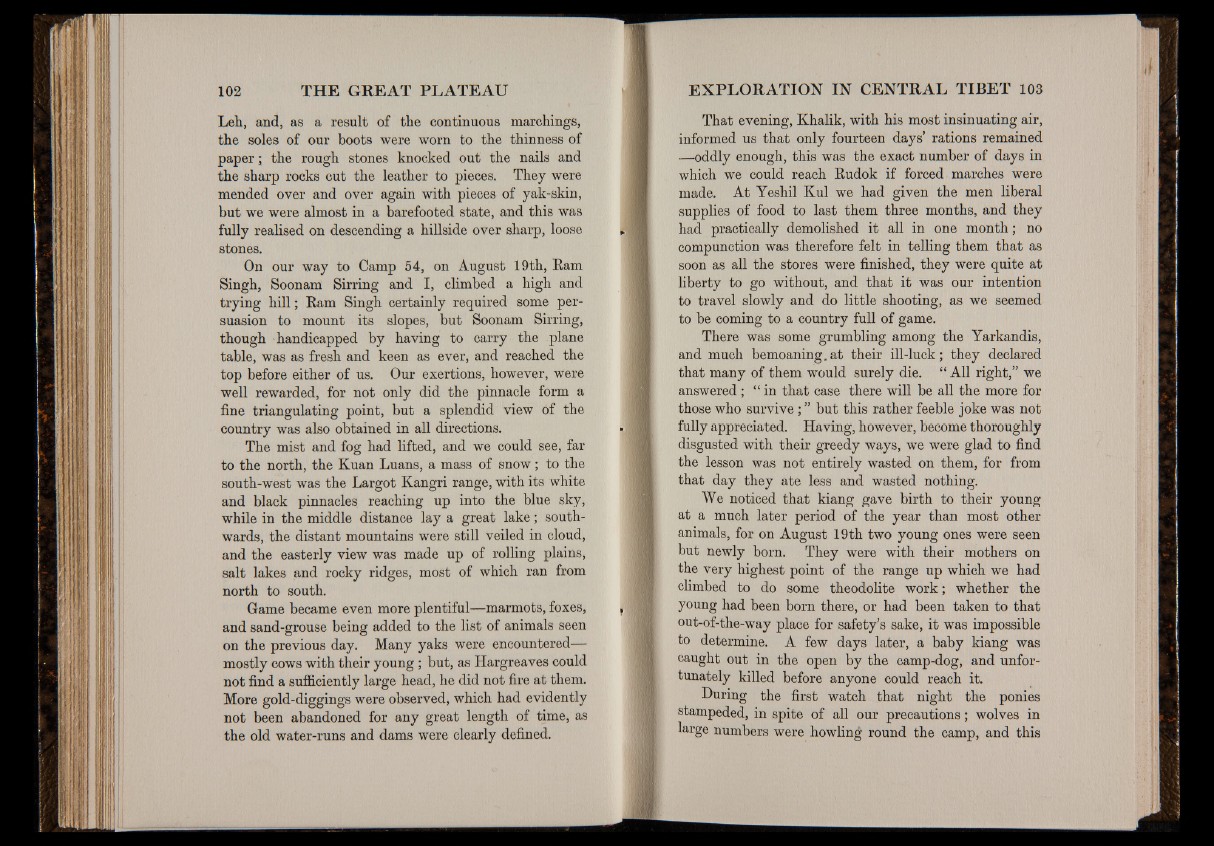
Leh, and, as a result of the continuous marchings,
the soles of our boots were worn to the thinness of
paper; the rough stones knocked out the nails and
the sharp rocks cut the leather to pieces. They were
mended over and over again with pieces of yak-skin,
but we were almost in a barefooted state, and this was
fully realised on descending a hillside over sharp, loose
stones.
On our way to Camp 54, on August 19th, Ram
Singh, Soonam Sirring and I, climbed a high and
trying h ill; Ram Singh certainly required some persuasion
to mount its slopes, but Soonam Sirring,
though handicapped by having to carry the plane
table, was as fresh and keen as ever, and reached the
top before either of us. Our exertions, however, were
well rewarded, for not only did the pinnacle form a
fine triangulating point, but a splendid view of the
country was also obtained in all directions.
The mist and fog had lifted, and we could see, far
to the north, the Kuan Luans, a mass of snow; to the
south-west was the Largot Kangri range, with its white
and black pinnacles reaching up into the blue sky,
while in the middle distance lay a great lake; southwards,
the distant mountains were still veiled in cloud,
and the easterly view was made up of rolling plains,
salt lakes and rocky ridges, most of which ran from
north to south.
Game became even more plentiful—marmots, foxes,
and sand-grouse being added to the list of animals seen
on the previous day. Many yaks were encountered—
mostly cows with their young; but, as Hargreaves could
not find a sufficiently large head, he did not fire at them.
More gold-diggings were observed, which had evidently
not been abandoned for any great length of time, as
the old water-runs and dams were clearly defined.
That evening, Khalik, with his most insinuating air,
informed us that only fourteen days’ rations remained
—oddly enough, this was the exact number of days in
which we could reach Rudok if forced marches were
made. At Yeshil Kul we had given the men liberal
supplies of food to last them three months, and they
had practically demolished it all in one month; no
compunction was therefore felt in telling them that as
soon as all the stores were finished, they were quite at
liberty to go without, and that it was our intention
to travel slowly and do little shooting, as we seemed
to be coming to a country full of game.
There was some grumbling among the Yarkandis,
and much bemoaning, at their ill-luck; they declared
that many of them would surely die. “ All right,” we
answered ; “ in that case there will be all the more for
those who survive ; ” but this rather feeble joke was not
fully appreciated. Having, however, become thoroughly
disgusted with their greedy ways, we were glad to find
the lesson was not entirely wasted on them, for from
that day they ate less and wasted nothing.
We noticed that kiang gave birth to their young
at a much later period of the year than most other
animals, for on August 19th two young ones were seen
but newly born. They were with their mothers on
the very highest point of the range up which we had
climbed to do some theodolite work; whether the
young had been born there, or had been taken to that
out-of-the-way place for safety’s sake, it was impossible
to determine. A few days later, a baby kiang was
caught out in the open by the camp-dog, and unfortunately
killed before anyone could reach it.
During the first watch that night the ponies
stampeded, in spite of all our precautions; wolves in
large numbers were howling round the camp, and this